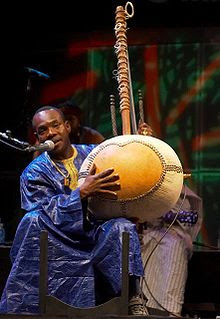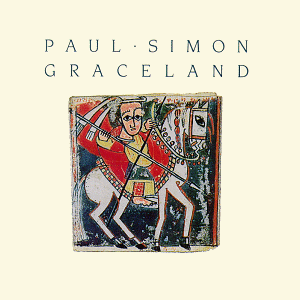
My romance with the music of North Africa began some twenty years or so ago, when I first heard a recording by Toumani Diabate, the Malian kora player (and prince, according to the blurb on the cassette I bought). I was enchanted.
I don’t know what led me to his music, though back then I was listening to Ry Cooder, Peter Gabriel, and Paul Simon’s Graceland album which featured Ladysmith Black Mambazo - and hearing about World Music and the WOMAD festival for the first time.

Tie this in with my discovery, in the late 70s, of Ethiopian – Byzantine - religious icons which I loved for their colour and strength of line, in such contrast to the western meek-and-mild iconography I'd grown up with. (Where did I come across them? How? Pre-Internet, I don’t know. Could it have been through……… the public library service and ……..books?!......) Until then, Ethiopia - like most of Africa -was only associated in my mind with famine and destitution. One more country in a tragic continent. As I've since discovered, the Ethiopia of Lalibela and the Byzantine rock churches, and the other ancient kingdoms and cultures of North Africa were as rich and splendid as those of the Mayans, Aztecs and Incas of Central and South America. Some elements have survived - those carved out of rock - and the musical traditions.

And in the textiles and handicrafts. Art at grassroots level. As a summer season waitress at Heathrow Airport in 1980, I used to spend my breaks in Terminal 4 watching the parade of gorgeous traditional robes and headdresses as passengers from long-haul flights from Africa and Asia came through Arrivals. What a contrast to western mass-produced business suits, yoof-black and denim, all practical, sensible, self-effacing, and dull, dull, dull. I had a taste for something more colourful, less urban, and less mass-produced than the clothes - and music - of my own culture.
I grew up with BBC Radio 2 in the background: middle-of-the-road easy listening, Terry Wogan and established pop rather than chart hits. Then there was my parents’ record collection – show tunes, Mozart, Dvorak, Latin American and ballroom. On the whole, I preferred these to the chart hits of my teens.
Then I started going out with a really talented guitarist, who spent hours coaxing all sorts of music out of his acoustic guitar, and also played lead guitar in an R&B band. (This isn't them.)
For me, R&B – of the Muddy Waters & B.B. King variety – is feel-good music, and it’s meant to be live: bars and clubs with tables crowded in the sweaty, noisy, half-gloom, within nudging distance of the band, where you can rock and stomp, and watch their faces and fingers, and listen to that sound – almost as much a part of the music as the band playing it.
And when did I last go to anything like this? Er……..
But I love live music, and, in recordings, I love the kind of music where I can hear instruments and voices. What grabs me is the sense of people making music, of it being live, I suppose. Perhaps the way I listen to music is akin to the way I watch a film, or read a novel: I get right in there.
Until this year, I’d only listened to Toumani Diabate, and the late Ali Farka Touré; but through the magic of Limewire, I’ve traced the musicians and singers that they’ve recorded with, and the musicians and singers that they’ve recorded with, in something closer to Ariadne’s web than Odysseus’s wanderings. Limewire’s also great for following up on people featured in film soundtracks – and here the African connection leads from the Matthew MacConnaughey / Penelope Cruz Sahara, and from Babel to all sorts of people and music. Papa Wemba. Brenda Fassie. Ismaël Lo. Myriam Makeba. Oumou Sangare. Angelique Kidjo. And Habibi bought me the Putumayo Women of Africa album for Christmas. I’m a fan of Putumayo: people like me get to hear people they won’t have heard on the radio - yet; and fabulously talented people get the recognition they deserve, and access to a wider market without having to remodel themselves on Barbie or 50Pence, record in English, or go Lounge. It’s a good thing!
No comments:
Post a Comment